Crafting a Natural Weed Killer with Epsom Salt & Vinegar
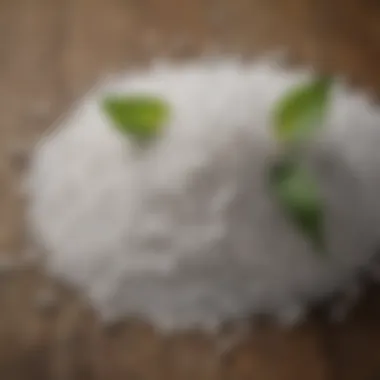
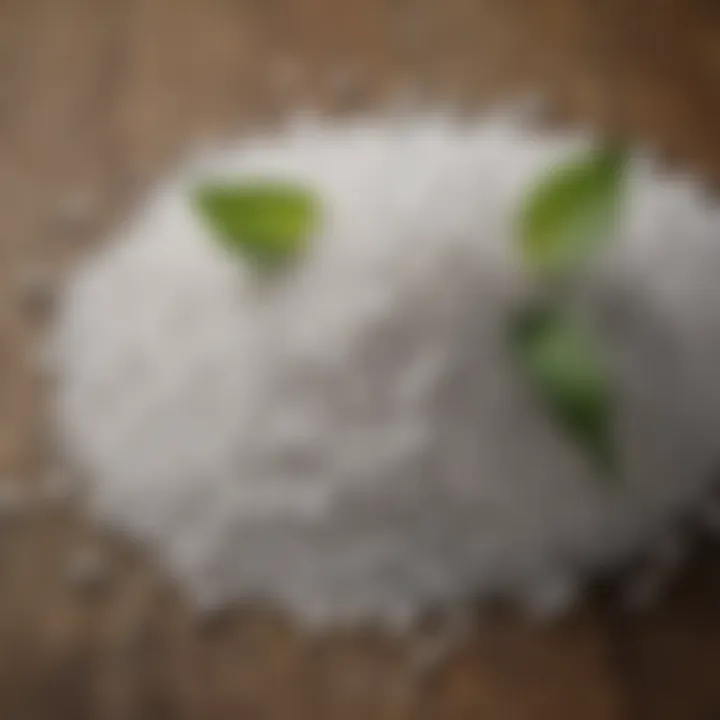
Intro
Weeds can be a persistent nuisance in any garden, often outcompeting desirable plants for resources like sunlight and nutrients. Many gardeners seek effective solutions to combat these unwelcome invaders. While synthetic herbicides are widely used, they often come with environmental concerns and potential safety issues. For those seeking a more natural approach, a blend of Epsom salt and vinegar presents a promising option. This article will provide the necessary insights and guidance for crafting an effective natural weed killer using these common ingredients.
In this exploration, we will examine the properties of each component, understanding how they work synergistically to manage weeds. Additionally, we will detail step-by-step instructions for preparation and application, along with practical tips for ensuring safety and effectiveness. By harnessing the power of simple ingredients, readers can take a more eco-friendly approach in their garden while achieving satisfying results.
Recipe Overview
Brief Summary of the Recipe
The natural weed killer recipe utilizing Epsom salt and vinegar is both straightforward and effective. By combining these two elements, you create a solution capable of wilting and killing unwanted plants. The vinegar contains acetic acid, which dehydrates weeds, while Epsom salt contributes magnesium, enhancing the formula's overall effectiveness.
Key Ingredients and Tools Needed
To prepare this natural weed killer, you will need:
- 1 gallon of white vinegar (5% acetic acid)
- 2 cups of Epsom salt
- 1 tablespoon of liquid dish soap (helps the mixture adhere to plant leaves)
- A large mixing container
- A spray bottle or garden sprayer for application
Before beginning, ensure that all tools are clean to maintain the purity of your solution.
Prolusion
Weeds present a significant challenge to gardeners and homeowners. They compete with desired plants for nutrients, light, and space, often leading to reduced crop yields and aesthetics. In this article, we address the issue of weed management through a natural approach. Using a recipe that combines Epsom salt and vinegar, we aim to provide a solution that is both effective and environmentally friendly.
Understanding the importance of natural weed killers is essential, especially in a world increasingly aware of the adverse effects of synthetic chemicals. This method not only helps eliminate unwanted plants but also aligns with organic gardening principles. The focus will be on how the ingredients work together to disrupt the growth of weeds while remaining safe for the surrounding environment.
In the sections that follow, we will delve into the properties of Epsom salt and vinegar, detail the formulation of the weed killer, and explore safety considerations. By the end of this guide, readers will be equipped with the knowledge and tools to combat weeds effectively, thus enhancing their gardening experience.
Understanding Weeds
Weeds can be more than just an eyesore in gardens and lawns. Understanding them is crucial for effective management, especially when using natural solutions like Epsom salt and vinegar. Weeds compete with desired plants for water, nutrients, and sunlight. This competition can stunt the growth of cultivated plants, impacting both aesthetic appeal and crop yields. Familiarity with common types of weeds in your area can help in identifying and addressing them appropriately.
Common Types of Weeds
Not all weeds are the same. Understanding the different types aids in formulating effective control strategies. Some of the most common types include:
- Broadleaf Weeds: These have wide leaves and grow low to the ground. Examples include dandelions and clover.
- Grassy Weeds: Similar to lawn grasses. Common examples are crabgrass and Bermuda grass.
- Perennial Weeds: These return year after year, establishing deep roots. Examples include thistles and bindweed.
- Annual Weeds: They complete their life cycle in one season. Examples are pigweed and foxtail.
Identifying these types allows the gardener to customize their approach when using natural weed killers.
Why Weeds Are Problematic
Weeds pose various problems for gardeners and farmers alike. Their aggressive growth can overshadow and outcompete more desirable plants. This not only affects the visual aesthetics but can also lead to:
- Reduced Crop Yields: Weeds absorb nutrients that are essential for the growth of vegetables or flowers.
- Increased Pest Habitat: Certain weeds attract pests that can harm desired plants.
- Soil Erosion: Weeds can lead to soil degradation, particularly if they are allowed to spread unchecked.
- Allergy Triggers: Some weeds can aggravate allergies and respiratory issues due to their pollen.
It becomes evident that weeds can significantly impact both the ecosystem of a garden and the emotional well-being of gardeners. Learning to manage them effectively, particularly through natural solutions like the Epsom salt and vinegar method, is vital for sustainable gardening practices.
The Importance of Natural Solutions
Natural solutions for weed control have gained traction among gardeners and environmental advocates alike. Using natural ingredients like Epsom salt and vinegar provides a safer alternative to synthetic herbicides. Synthetic herbicides often leave residues and can leach into water supplies, affecting ecosystems and potentially harming human health. With increasing concerns about environmental sustainability, it is crucial to explore methods to manage weeds responsibly.
Environmental Impact of Chemical Herbicides
Chemical herbicides can have detrimental effects on the environment. When these products are applied, they can drift into non-target areas through wind or runoff, impacting beneficial plants and wildlife. This unintended exposure can disrupt local ecosystems and harm pollinators, like bees, which are vital for plant reproduction. Furthermore, persistent chemical residues in the soil and water can result in long-term environmental degradation.
"The pervasive use of synthetic herbicides poses not only a risk to natural ecosystems but also to human health through groundwater contamination."
Natural solutions, by contrast, minimize these adverse effects. Ingredients such as Epsom salt and vinegar break down more easily in the environment and do not contribute to soil or water contamination. By adopting practices that employ natural ingredients, gardeners can contribute to a healthier ecosystem.
Benefits of Using Natural Ingredients
Choosing natural ingredients for weed control carries several benefits. Firstly, one can avoid the health risks associated with chemical exposure. Many conventional herbicides contain toxic substances that can affect human health through skin contact or inhalation. By using a natural formulation, individuals can maintain a healthier gardening environment.
Additionally, natural solutions often promote soil health. Organic materials can enhance soil structure and increase its capacity to hold moisture and nutrients. Epsom salt, for instance, not only helps in weed management but also provides magnesium and sulfur, essential nutrients for plant growth.
Using natural solutions can also foster a sense of community and ecological responsibility. As more gardeners opt for environmentally friendly practices, it encourages a shift towards more sustainable gardening methods. This approach not only helps in personal gardens but supports broader ecological efforts.
In summary, opting for natural solutions transforms the weed management process into a more responsible, effective, and sustainable practice. With minimal negative impact on the environment and potential benefits to overall plant health, it's clear why Epsom salt and vinegar stand out as a wise choice for any gardener looking to control weeds efficiently.
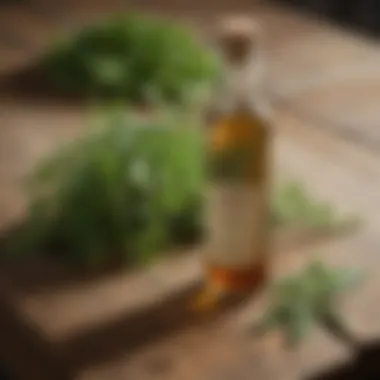

Epsom Salt: Beyond the Bath
Epsom salt, commonly known for its soothing properties in baths, has a much wider application, particularly in gardening and pest control. Its primary component, magnesium sulfate, offers several unique benefits for both plants and as an effective natural weed killer. Understanding these benefits is essential for those looking to maintain their gardens in an environmentally friendly way. Epsom salt can not only aid in plant growth, but also serve a vital role in combating unwanted vegetation, making it a simple yet powerful tool in natural weed management.
Chemical Composition
Epsom salt is chemically defined as magnesium sulfate (MgSO₄). This compound consists of magnesium, sulfur, and oxygen. Each of these elements plays a crucial role in plant health. Magnesium helps in chlorophyll production, which is necessary for photosynthesis. Sulfur is equally important as it contributes to the formation of proteins and enzymes in plants. While these components are essential for plant growth, they also contribute to the weed-killing efficacy of Epsom salt. When applied directly to weeds, the magnesium in Epsom salt may affect their growth processes, inhibiting their ability to thrive in the garden.
Weed-Killing Properties
The weed-killing properties of Epsom salt are attributed mainly to its high magnesium content, combined with the potential desiccating effect of the salt itself. When mixed with vinegar, the acidity enhances these properties. Applying this mixture can lead to the dehydration of weeds.
- Desiccation: The salt draws moisture out of the weed's tissues, leading to wilting and eventual death.
- Targeted Effect: Unlike traditional herbicides, which can affect a broad range of flora, this solution can be applied selectively to unwanted plants while being less harmful to surrounding vegetation when used carefully.
"Epsom salt serves both as a beneficial additive to soil and a weapon against weeds. Its natural composition ensures it is safer for the environment compared to chemical alternatives."
Using this knowledge of Epsom salt's properties, gardeners can thoughtfully implement it in their weed control strategies, achieving effective results without relying on synthetic chemicals.
Vinegar: An Effective Acidity
Vinegar plays a critical role in the formulation of natural weed killers. Its effective acidity contributes significantly to the suppression and eradication of unwanted weeds in gardens or yards. Made primarily of acetic acid and water, vinegar’s primary active component makes it a potent yet simple solution for targeting weeds. As readers will see, understanding the types of vinegar available can guide effective application, optimizing results in the fight against weed growth.
Types of Vinegar and Their Uses
There are several types of vinegar available, each with distinct properties and varying levels of acidity. The most common types used for weed control include:
- White vinegar: This is the most popular type for household use. It typically contains about 5% acetic acid, making it suitable for general weed management.
- Apple cider vinegar: With a similar acidity level, apple cider vinegar is often favored for its mild scent. It can be effective, though the higher sugar content may attract beneficial insects.
- Cleaning vinegar: This type has a higher acidity, generally around 6% to 7%. It is more potent against tough weeds but should be used with caution around desirable plants.
- Balsamic vinegar: While not often recommended for weed control, this vinegar can be effective due to its acidity, though it tends to be pricier and messier than the other types.
Understanding these types ensures users select the most appropriate vinegar for their specific needs.
How Acidity Affects Weeds
The effectiveness of vinegar as a weed killer primarily comes down to its acid content. When applied to weeds, the acetic acid penetrates the plant tissues, causing dehydration and eventual death. Several important factors should be considered regarding its impact:
- Concentration: The higher the acetic acid concentration, the more effective the vinegar is at killing weeds. While household vinegar works for smaller infestations, stronger solutions can manage larger or more persistent weeds.
- Application Timing: Effectiveness can vary with environmental conditions. Applying vinegar on a hot, sunny day enhances its action as the high temperatures promote evaporation and concentration of the acid.
- Plant Types: Different weeds respond variably to the acidity. Some tougher varieties may require multiple applications, while more sensitive weeds may perish almost immediately.
In summary, vinegar’s acidity is a vital aspect of its utility as a natural weed killer. By understanding the types of vinegar and how they interact with weeds, users can make informed choices for effective garden management.
"Vinegar’s acetic acid is a simple yet powerful alternative to chemical herbicides, making it a preferred choice for the environmentally conscious gardener."
Creating the Weed Killer Solution
Creating an effective weed killer solution is a critical step in managing unwanted plant growth in gardens and yards. By using simple, natural ingredients like Epsom salt and vinegar, it is possible to reduce the reliance on chemical herbicides, which often have detrimental effects on the environment and health. This section will cover the specific elements needed to craft this solution, along with valuable considerations for its use.
Ingredients Required
The ingredients for the natural weed killer are straightforward. You will need:
- Epsom Salt: This consists of magnesium sulfate, which not only helps with weed control but also providing some nutrients that can improve overall plant health when used appropriately in the environment.
- Vinegar: A solution of 20% acetic acid is preferred, as this higher concentration is more effective at killing weeds compared to regular household vinegar.White vinegar or apple cider vinegar can also be used, though they might require larger quantities.
- Water: To dilute the mixture and make it more manageable for application.
Optional:
- Dish Soap: A small amount can be added to help the solution adhere to the leaves of the weeds, enhancing effectiveness.
Step-by-Step Instructions
Creating the weed killer solution is simple and can be done in a few easy steps:
- Gather Materials: Ensure all ingredients are ready and have a clean spray bottle or container for mixing solutions.
- Mix the Ingredients: In a bucket or large bottle, combine the following:
- Stir Well: Use a stick or spoon to mix thoroughly until the Epsom salt is completely dissolved. This creates an even solution that can be sprayed on weeds.
- Transfer to Spray Bottle: Pour the solution into a spray bottle for easy application. Make sure to label it clearly to avoid any confusion later.
- Test the Solution: Before applying it broadly, test on a small area or a few weeds to ensure it works effectively without harming nearby plants.
- Storage: Store any unused solution in a cool, dark place. Shake well before each use, as ingredients may settle over time.
- 1 cup of Epsom salt
- 2 cups of vinegar (preferably the 20% acetic variety)
- 1 gallon of water
- If using, 1 tablespoon of dish soap
Important: Always wear gloves and avoid contact with skin and eyes when mixing and applying, as the high vinegar concentration can cause irritation.
The proper creation of this weed killer solution allows for a more manageable and responsible approach to weed control, aligning with the natural ethos many gardeners are trying to achieve.
Application Techniques
Understanding the application techniques for your natural weed killer is crucial for its effectiveness. Proper application not only enhances the efficiency of the solution but also minimizes potential harm to other plants in your garden. This section will outline the timing for application and the methods you can use to ensure the best results.
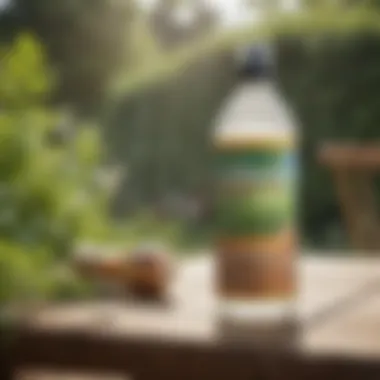

When to Apply the Solution
Timing is critical when using Epsom salt and vinegar as a weed killer. Ideally, you should apply the solution on a clear, sunny day. The sunlight helps to accelerate the action of the vinegar, which is an acid, and allows it to work more effectively against weeds. Early summer or late spring is often recommended, as these times coincide with the period when weeds are actively growing.
"The best time to treat your plants is during their vigorous growth phase, which often enhances the effectiveness of natural solutions."
It is also important to avoid applying the solution right after rain. Wet conditions can dilute the vinegar and reduce its efficacy. Additionally, applying during the cooler parts of the day, like early morning or late afternoon, can prevent evaporation of the solution, allowing it to remain on the weed long enough to disrupt its growth.
Methods of Application
There are different methods to apply the Epsom salt and vinegar solution effectively. Each method can cater to various weed problems and garden setups.
- Spray Method:
- Soaking Method:
- Targeted Application:
- Dilution Application:
- This method involves using a spray bottle or garden sprayer. Make sure to spray directly on the leaves and stems of the weeds. This approach allows for precise application, minimizing contact with desired plants.
- For larger or stubborn weeds, consider soaking the base of the plants with the solution. This method ensures that the roots also absorb the mixture which can lead to more lasting effects. Use this method carefully to avoid hurting your other plants.
- If you notice weeds are interspersed with desirable plants, you can use a brush to apply the solution. Dip the brush in the liquid and carefully paint the solution on the weed leaves. This minimizes the risk of damaging your other plants.
- In situations where you are dealing with a large area, it might be wise to dilute your solution slightly with water. This will still allow you to treat the weeds while protecting surrounding flora from excessive acidity.
When following these methods, ensure you wear gloves and possibly goggles to protect your skin and eyes from accidental splashes. Understanding these techniques will maximize the effectiveness of your natural weed killer while safeguarding the rest of your garden.
Safety Considerations
When creating and using a natural weed killer, safety cannot be overlooked. This section will cover important aspects of handling the ingredients and their effects on the environment.
Handling Epsom Salt and Vinegar
Epsom salt and vinegar are generally safe to handle. However, some precautions should be in place. Epsom salt, chemically known as magnesium sulfate, can be ingested in small amounts but is not suitable for large quantities. If ingested in significant amounts, it may cause gastrointestinal distress. Always wash your hands after handling the salt to avoid any irritation.
Vinegar, particularly in its higher concentrations used for weed killing, can be dangerous if it comes into contact with skin or eyes. Ensure gloves are used when applying this solution. If accidental contact occurs, rinse the skin or eyes with plenty of water for several minutes. Furthermore, ensure proper ventilation during application, especially in enclosed spaces, to avoid inhaling fumes.
"Taking proper safety measures allows you to use natural ingredients effectively while minimizing health risks."
Effects on Desired Plants
While the focus is on eliminating weeds, the potential impact on desired plants must be acknowledged. Both Epsom salt and vinegar are not selective in their action. This means they can affect any plant they come in contact with, not just weeds. Users must apply these substances carefully, using targeted methods to avoid unwanted damage to flowers, shrubs, or vegetables.
To mitigate risks, here are some considerations:
- Apply during calm weather: Wind can carry the solution to unintended areas.
- Use a spray nozzle: This helps to deliver the solution precisely where it’s needed.
- Create barriers: Cover desired plants with cardboard or plastic to shield them during application.
By understanding the safety aspects and potential impacts, users can make an informed decision when using Epsom salt and vinegar as a natural weed killer.
Limitations of the Natural Solution
While crafting a natural weed killer using Epsom salt and vinegar can be effective, it is important to recognize the limitations of this approach. Understanding these constraints allows gardeners to set realistic expectations and explore complementary methods for weed control.
Effectiveness on Different Weed Types
Not all weeds respond uniformly to homemade solutions. The effectiveness of Epsom salt and vinegar varies depending on the species of weed. For example, annual weeds like chickweed or crabgrass often succumb quickly to this solution due to their shallow root systems. In contrast, perennial weeds such as dandelions and bindweed present a more significant challenge. Their deep root structures make them more resilient to superficial treatments. Therefore, practitioners should not rely solely on this combination for persistent or deeply-rooted weeds, as they may require more targeted interventions.
Weather and Environmental Factors
Environmental conditions play a crucial role in the success of natural weed killers. Ideal application scenarios include sunny days where the temperature is warm. Sunlight enhances the effectiveness of vinegar's acetic acid, increasing its ability to penetrate and damage plant tissues. Moreover, dry conditions prevent the solution from being washed away soon after application. However, rain or excessive humidity can dilute the effectiveness of the solution or wash it away, leading to disappointing results. It is imperative for gardeners to monitor environmental forecasts and choose the right timing for applications to maximize efficacy.
In summary, while Epsom salt and vinegar provide a natural alternative to chemical herbicides, the approach has limitations. Effectiveness varies by weed type, and environmental conditions significantly influence the results.
In light of these considerations, it is essential for users to employ a blend of weed management strategies, combining this natural solution with cultural or mechanical methods for a more comprehensive approach to weed control.
Alternative Natural Remedies
The topic of alternative natural remedies holds substantial significance in the context of weed management. As more individuals seek sustainable and eco-friendly methods of gardening, the need for alternatives to synthetic herbicides becomes increasingly clear. Using natural remedies provides benefits not only for weed control but also contributes positively to the larger environmental picture.
Alternative methods often rely on readily available materials, which can be cost-effective and convenient. This approach reduces reliance on chemical treatments that might have adverse effects on soil health and surrounding ecosystems. It also resonates with the growing awareness of personal health and safety, particularly among those with sensitivities or aversions to industrial chemicals.
Salt-Based Solutions
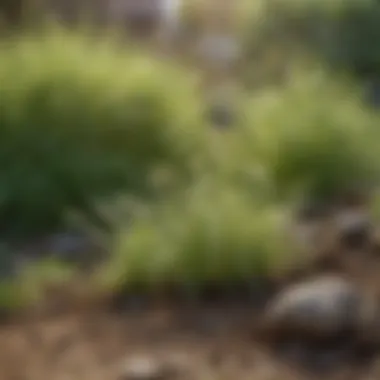

Salt-based solutions have proven effective in killing weeds due to their dehydrating properties. Sodium chloride, the most commonly used salt, acts by drawing moisture out of plant cells. When applied directly, the salt can cause wilting and eventual death of weeds. However, it is essential to use salt judiciously, as excessive application can lead to soil salinity issues and negatively impact desired plants.
To make a simple salt-based weed killer, mix salt with water in a spray bottle or garden sprayer. A typical ratio could be three parts water to one part salt. After mixing, the solution can be sprayed directly onto the target weeds on a sunny day to maximize the effectiveness. This method is best for areas where you do not intend to grow anything else for a while.
Considerations for Salt Solutions:
- Use only where non-plant areas are desired.
- Test on a small area first to check for any negative effects on surrounding plants.
- Beware of runoff into nearby areas where you want other vegetation to thrive.
Boiling Water and Other Techniques
Boiling water is an old yet effective method to control weeds. This technique involves pouring boiling water directly onto the leaves and roots of the weeds. The extreme heat causes cell rupture, effectively killing the plant. It is suitable for driveways, patios, and areas where weeds are persistent but where you want to preserve the surrounding flora.
Other techniques include the use of mulching and the introduction of beneficial plants that outcompete weeds. These methods create a more sustainable garden ecosystem. Applying a thick layer of organic mulch around plants can prevent sunlight from reaching weeds. Similarly, selecting plants that grow quickly and form dense foliage can naturally suppress weed growth, reducing the need for additional intervention.
"The best way to deal with weeds often lies in preventing their establishment through methodical gardening and appropriate techniques."
Natural remedies offer a diverse array of approaches to tackling weeds without resorting to commercial herbicides. Each method requires thoughtful consideration regarding its application and effects, thus allowing for effective management of unwanted plants while nurturing a healthier garden environment.
Case Studies and Real-Life Applications
The significance of case studies and real-life applications in crafting a natural weed killer using Epsom salt and vinegar cannot be overstated. They serve as practical demonstrations that validate the efficacy of this method and provide illustrative examples that can encourage individuals to adopt it. Real-world experiences inform potential users not only about the formulation and application of the solution but also about its real-time results and adjustments needed based on specific environments or conditions.
By analyzing case studies, readers can glean insight into the contextual factors that could influence the outcome when using this natural solution. Common benefits include reduced environmental impact, cost-effectiveness, and success in various garden types. However, users can also consider limitations reported in specific scenarios, which can enhance their understanding and preparation. This makes case studies a critical catalyst for successful application.
Successful Use in Gardens
Many gardeners have found notable success using a mixture of Epsom salt and vinegar as an effective weed killer in their gardens. One case involved a small urban garden where persistent dandelions threatened the overall health of the plants. The gardener mixed equal parts of white vinegar and Epsom salt, creating a potent solution that was sprayed directly onto the leaves of the dandelions. Over the course of a week, visible signs of wilting were observed as the weeds began to die off, allowing neighboring plants to thrive without competition.
Another instance occurred in a community garden project where participants were seeking organic solutions to maintain their shared space. The garden used Epsom salt and vinegar in combination with other natural methods, such as mulching and hand-pulling weeds. Results were shared online, showcasing lush, healthy plants and minimal weed growth. This approach helped garner interest in natural gardening methods, proving beneficial both to aesthetics and environmental health.
Anecdotal Evidence of Effectiveness
Anecdotal evidence serves as a compelling adjunct to more formal case studies. Numerous online platforms, such as Reddit, feature testimonials from homeowners who report successfully eliminating stubborn weeds through the use of Epsom salt and vinegar. Many users share their experiences, highlighting how they appreciate the journey of crafting their weed solution. For example, one user noted that mixing a concentrated solution worked wonders on their patio, where weeds had long established roots within the cracks.
Others offer tips regarding the timing of application, emphasizing that early morning or late afternoon is preferable. This anecdotal evidence often emphasizes the need for consistent application and acknowledges occasional setbacks. Users remark on the gradual results, discussing noticeable decreases in weed presence and improvements in plant health, demonstrating that patience is a significant factor in success.
The collective experiences of users provide a treasure trove of information, proving that the combination of Epsom salt and vinegar can truly transform the way we manage weeds in our gardens.
These narratives reinforce the practicality of using natural products for weed control and allude to the broader feedback loop within gardening communities. They exemplify how peer experiences can motivate individuals to explore sustainable methods, creating a more engaged and educated audience.
The End
The conclusion serves as a pivotal segment in the journey of crafting a natural weed killer using Epsom salt and vinegar. It encapsulates the insights gleaned from the previous sections and reinforces the benefits of choosing natural methods over synthetic alternatives. Understanding the simplicity and efficacy of such a solution emphasizes that effective weed management does not necessitate complex chemical formulations.
When one considers the practicalities of implementing a weed killer, the recipe laid out in this article offers tangible benefits. Not only is the solution easy to formulate, but it also addresses vital environmental considerations. Using Epsom salt and vinegar helps retain soil health while effectively managing unwanted plants.
Equipped with knowledge of application techniques, readers can maximize the effectiveness of the solution, ensuring that application is done judiciously. This is crucial, especially as the impact of weeds can disrupt not just gardens but broader ecosystems.
By reflecting on the various aspects discussed throughout the article, including ingredient properties and successful application methods, it becomes clear that this natural weed killer is not only a viable alternative to commercial products but also aligns with a more sustainable lifestyle. Overall, embracing such natural solutions empowers individuals to manage their gardens with awareness and confidence.
"The journey towards sustainable gardening starts with the choices we make about what products we use."
Further Reading and Resources
Exploring the facets of natural weed killers using Epsom salt and vinegar does not end with a simple recipe; it opens a multitude of avenues for deeper understanding. This section invites readers to further their knowledge about botanical chemistry, eco-friendly gardening methods, and effective weed management strategies. The significance of these resources becomes evident as they provide a broader context to the techniques discussed earlier.
Importance of Further Reading
Natural weed management is a continuous learning process. Engaging with literature on this topic allows enthusiasts and gardeners to learn about the new trends and innovations in green solutions. The scientific basis of how ingredients like Epsom salt and vinegar interact with weeds can be explored in detail through academic articles. Moreover, soil health, plant care, and integrated pest management are interconnected domains that are worth examining.
Benefits of Expanded Knowledge
By venturing into additional materials, readers can achieve several advantages:
- Comprehensive Understanding: Gaining knowledge about related topics such as soil pH, moisture content, and seasonal planting cycles can help in strategizing effective weed control.
- Holistic Gardening Practices: Understanding companion planting and organic fertilizers enriches the overall gardening approach, enhancing plant health while reducing weed prevalence.
- Community Insights: Engaging with forums and social media groups provides community insights and experiences, which can highlight real-world applications of similar methods.
Considerations for Resources
When searching for resources, it is essential to evaluate their credibility. Peer-reviewed journals, reputable gardening websites, and educational platforms can provide reliable guidance. Furthermore, engaging with user-generated content from platforms like Reddit can offer practical advice and anecdotal evidence that supports the application.
Recommended Platforms
- Wikipedia: An excellent starting point for fundamental concepts and scientific information.
- Britannica: Offers curated articles that ensure well-researched content on plant biology and gardening techniques.
- Reddit: A place where community members share practical experiences and troubleshoot problems related to natural weed killers.
- Facebook Groups: Interact with fellow gardening enthusiasts who can provide support and resources tailored to your gardening needs.
Cultivating knowledge by exploring further reading is vital for anyone interested in eco-friendly gardening. The journey towards effective natural weed management using Epsom salt and vinegar is complemented by continual learning and application of broader concepts.







